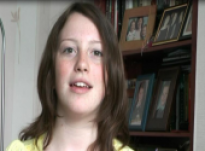Heather

Heather took part in a clinical trial as a healthy control. The trial compared the results of tests among healthy children and children with attention deficit and hyperactive disorder. The trial was over one day and involved taking part in lots of different tests. Heather enjoyed the experience.
Heather, aged 18, is White British, has one brother and lives with her parents. She enjoys rock climbing, playing the piano and reading. Heather's mum volunteered for her to take part in a clinical trial at their local hospital. Heather took part in the trial as a healthy control.
More about me...
Heather, aged 18 has just finished her A levels and is hoping to follow a career in teaching. She lives with her parents and her brother. Heather’s mother volunteered for her and her brother to take part in a clinical trial to compare development of healthy children and children with attention deficit and hyperactive disorder (ADHD). Heather remembers that the trial was to find something within the brain, a certain chemical that creates ADHD, and they were using people who didn’t have ADHD as controls.
Heather says that even though her mum volunteered her, she was really “Up for it, because it was something new”. As part of the trial Heather took part in a number of tests; computer concentration tests, bone density scans, fat percentage scans, oxygen consumption tests, ultrasounds and food monitoring. The only test that Heather didn’t enjoy as much was the oxygen consumption test that involved being in a cubicle and keeping very still which Heather says was quite hard. However, overall Heather really enjoyed taking part and would certainly do something similar again.
In terms of payment for taking part in clinical trials, Heather felt there should be no payment as an incentive. Heather says it would be nice to get the results of the trial when it has completed' but that having results that were too detailed may confuse people.
Heather also thought it would be nice to know something about the background of the people running the trials, particularly for her age group as they were thinking about their future careers. She also felt that having a specialised website or company that you could look at for opportunities to be part of a clinical trial would be good. Heather would certainly encourage her peers to consider taking part in similar clinical trials.
Heather was really up for taking part in the research. As well as helping researchers she thought it might help with her future career in teaching.
Heather was really up for taking part in the research. As well as helping researchers she thought it might help with her future career in teaching.
There were lots of different tests and one or two felt a bit 'weird', but Heather said it was also very exciting to experience new things.
There were lots of different tests and one or two felt a bit 'weird', but Heather said it was also very exciting to experience new things.
Although one of the tests was a bit boring it was all fun to do and the researchers explained anything she was unsure about. As well as attending the hospital for a day, Heather had some monitoring to do at home too.
Although one of the tests was a bit boring it was all fun to do and the researchers explained anything she was unsure about. As well as attending the hospital for a day, Heather had some monitoring to do at home too.
Payment shouldn't be an incentive for taking part in research, but Heather can see that it might be necessary for some types of trials.
Payment shouldn't be an incentive for taking part in research, but Heather can see that it might be necessary for some types of trials.

